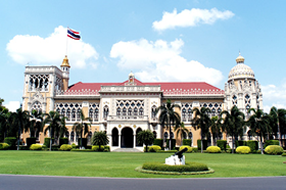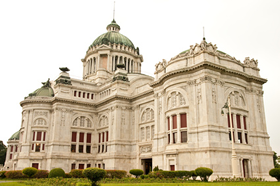Thailand Government Interesting Facts
The Thailand Government follows the system of a constitutional monarchy.
The king is the head of state, but his powers are limited. There are three branches – the Executive, Legislative and Judiciary – that are responsible for managing all activities related to governance. This system of government came into effect in 1932 that brought an end to absolute monarchy. However, under this system of democracy, the Thai government has witnessed several coups with power shifting between various military regimes. The most recent coup took place in 2006.

The Prime Minister is the Head of the executive function of the Thailand Government and has the powers to appoint or remove ministers from the cabinet. Usually, the position is held by the leader of the largest party or coalition. According to the guidelines laid down by the constitution, the lower house has to elect the Prime Minister, and then he or she will be officially appointed by the King of Thailand. Abhisit Vejjajiva of the Democrat Party was the Prime Minister from December 2008, until he was replaced after the general election in July 5th 2011 by Yingluck Shinawatra, who is Thailand’s first woman Prime Minister and also the sister of Thaksin Shinawatra, an earlier Prime Minister, who was ousted during the coup d’état of 2006.
The legislative branch of the Thailand Government (also referred to as the National Assembly) comprises two houses – the Senate and the House of Representatives.

The Senate, or the upper house, has 150 seats, of which 76 are occupied by nonpartisan elected representatives from each of the 75 provinces and 1 from the Bangkok Metropolitan Area. The remaining 74 are appointed or elected officials. Each Senate has a term of six years, and the members have the power to appoint members of the Judiciary and other agencies of the government of Thailand. The House of Representatives is the lower house with 500 members, the majority of whom are elected from the constituencies.
The Judiciary of the government in Thailand has three separate systems – the Court of Justice, the Administrative Court and the Constitutional Court. The legal system follows a mix of traditional Thai laws, which are based on the Hindu-Brahmin laws that were used during the Khmer rule, as well as western laws.
Besides this the Thailand government has a local system of governance, which operates in 76 provinces. For 74 of these, the Minister of Interior appoints governors, while the remaining two areas – Bangkok and Pattaya – appoint their own governors through a popular vote.
Although the Thailand Government runs through these three branches, and the king has limited powers in these functions, he is popular among the people as he is not only the Head of State, but also the head of the Royal Thai Army and the religious head as the protector of the Buddhist religion. In addition, he has certain special powers under the constitution such as the power of pardon, power of royal assent and the power to appoint his own heirs. As a result, the Thailand People hold great respect and reverence for him.